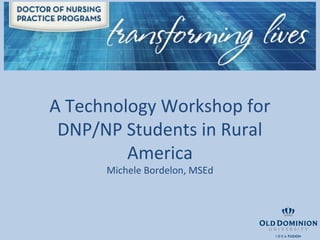Nonpf mlb presentation 2011 v2
- 1. A Technology Workshop for DNP/NP Students in Rural America Michele Bordelon, MSEd
- 2. A One-Day Technology Workshop ŌĆó On-campus weekend ŌĆó Fall semester ŌĆó Conducted at the Theresa A. Thomas Professional Skills Teaching and Assessment Center at Eastern Virginia Medical School in Norfolk, Virginia
- 3. Structured Around Hands-On Application ŌĆó Began with standardized patient session ŌĆó Followed by technology modules ŌĆō Social Media ŌĆō Telehealth ŌĆō Clinical Decision Support ŌĆō Electronic Health Records ŌĆó Students given follow-up assignment
- 4. Utilized Standardized Patients to Create Realistic Experience ŌĆó Stroke patient and caregiver ŌĆó Recently discharged from hospital ŌĆó Experiencing issues inherent in healthcare in rural America ŌĆō Lack of access to: ŌĆó Quality care ŌĆó Specialty care ŌĆó Education ŌĆō Isolation from social support systems ŌĆó Group interview identifying: ŌĆō Stroke impact, post-accident ŌĆō Availability of health care, living in a remote area ŌĆō Ability to utilize technology
- 5. Students Rotated through Four Technology Modules ŌĆó Hands-on exposure ŌĆó Armed with Information from standardized patient assessment ŌĆó 50 minutes with each module ŌĆó Each module included: ŌĆō Practical application activity ŌĆō Group presentations and discussion ŌĆó Demonstration ŌĆó Benefits and barriers ŌĆó Recommendations
- 6. Modules
- 7. Module on Use of Social Media for Patient, Caregiver and Provider Support and Education ŌĆó Overview of social media model ŌĆó Breakout groups of 2 or 3 ŌĆó Each group assigned specific task: ŌĆō Research social media ŌĆō Find appropriate Group presentation application, ŌĆó Why did you select? given earlier ŌĆó ŌĆ£TourŌĆØ of media patient/caregiver ŌĆó Benefits and barriers assessment ŌĆó Discussion and ŌĆō Make group presentation recommendations
- 8. Groups Given One of Three Assignments Using Social Media ŌĆó Group 1 ŌĆō using either YouTube or ICYou ŌĆō find an education video for stroke patient/caregiver ŌĆó Group 2 ŌĆō using The Stroke ŌĆó Group 3 ŌĆō using Facebook Network website ŌĆō or LinkedIn ŌĆō determine determine how how providers can access patient/caregiver can use other providers for support this site for social support and professional development purposes
- 9. Telehealth Module Provided Opportunity to Learn How to Work with a Patient ŌĆ£VirtuallyŌĆØ ŌĆó Participation in sample Telehealth ŌĆó Example: Have patient balance a session: book on the palm of each hand to ŌĆō Standardized ŌĆ£strokeŌĆØ patient and demonstrate equal balance and caregiver located in one room strength (vs. an in-person assessment ŌĆō Students in another room squeeze my two fingers, etc.) ŌĆō Both rooms set up with Telehealth video equipment for real-time conference
- 10. Practical Experience was Followed by Group Discussion ŌĆó What were the benefits? ŌĆó What were the barriers? ŌĆó What recommendations for use would you make? ŌĆó How can you use in your practice?
- 11. Clinical Decision Support Systems Taught Students How to Use Such Tools to Extend and Improve Care ŌĆó Utilizing tools ŌĆō such as stroke apps on the iPad (NIH stroke scale, epocrates) ŌĆó Instruction on how to go about obtaining apps ŌĆó Explored types of apps: ŌĆō For providers and patients ŌĆō Assessment ŌĆō Patient education
- 12. Students Assigned to Breakout Groups of 2 to 3 ŌĆó Instructed to find apps for: ŌĆō Stroke patients and caregivers ŌĆō Providers ŌĆó Demonstrate to group ŌĆō Benefits and barriers ŌĆō How to overcome barriers ŌĆō Recommendations
- 13. Electronic Health Records Module Exposed Students to Use of EHR ŌĆó Advantages: ŌĆō Ease of prescribing medications ŌĆō Referrals to specialists ŌĆō Transmission of patient data between providers ŌĆō Ease of access to information ŌĆó Disadvantages: ŌĆō Templates that constrain decisions ŌĆō Confidentiality ŌĆō Systems not compatible
- 14. There are Some Educational Constraints with EHR ŌĆó Training templates extremely expensive, if available at all ŌĆó Many templates arenŌĆÖt well populated with patients or experiences ŌĆó Many templates are too artificial
- 15. Students Followed Up Workshop with Technology Assignments ŌĆó Applied a modality to their respective practice settings ŌĆó Example: Facebook page for isolated siblings of chronically ill children ŌĆō A support community ŌĆō Moderated by provider ŌĆō Safe space ŌĆō Rules of Engagement
- 16. Workshop Results
- 17. As a Result of Workshop, Students Have Incorporated Technology in Their Practices ŌĆó Purchased iPads for practice ŌĆó Integrated clinical decision support ŌĆó Served on committees to chose EHR ŌĆó Introduced social media programs to patients and practices ŌĆó Some have fostered participation in TeleHealth networks

















